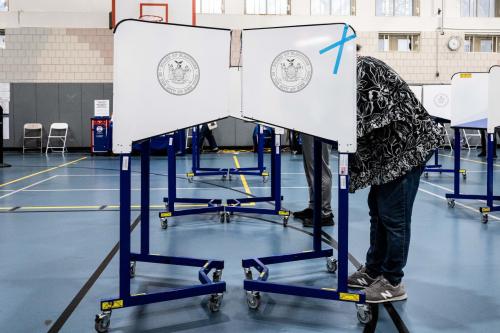This post originally appeared on Real Clear Policy on December 15, 2016.
Recidivism rates in the United States are high: two-thirds of offenders leaving prison will be re-arrested within three years. This is partly due to how difficult it is for people with criminal records to find reliable employment that can put them on a law-abiding track. Cities and states have struggled to find ways to help this group find jobs, and there is very little research to guide them. However, there is one innovative new policy that appears to make a big difference: court-issued certificates that signal an individual’s work-readiness.
Several jurisdictions across the country allow individuals with criminal records to seek “employability certificates” from local courts. It works like this: A judge considers evidence of the person’s actions since conviction and can issue a certificate if he or she is deemed to have been rehabilitated. The hope is that this piece of paper will convince employers to give job applicants with a criminal record a chance — particularly applicants with recent convictions. And it seems to work. New research finds that having an employability certificate dramatically improves a job applicant’s chances of getting an interview (and, presumably, a job).
Peter Leasure and Tia Stevens Andersen, both of the University of South Carolina, conducted research to examine the effectiveness of this program. They sent hundreds of fake job applications to employers, randomizing so that the applicant might have a year-old felony drug conviction or no criminal history or a year-old felony drug conviction and a court-issued employability certificate (called a “certificate of qualification for employment” in Ohio, where this study took place). They then waited to see which applicants received positive responses by phone or email (referred to as a “callback” in these types of studies). Consistent with other research, those applicants with felony convictions (and no certificates) were far less likely to receive callbacks than those with no criminal history. More specifically, 10 percent of those with a felony conviction received a positive response versus 29 percent of those with no criminal record. However, this disparity was almost entirely eliminated when the applicant had an employability certificate: Certificate holders received a positive response 25 percent of the time. Those with certificates were called back almost as often as those with no conviction at all.
A related study by Peter Leasure and Tara Martin, also of the University of South Carolina, shows that these certificates have similar positive effects for those applying for housing. This may be because landlords assume applicants with certificates are more likely to have steady incomes and therefore pay rent on time. Since finding stable housing is a primary obstacle for people with criminal records — and could affect someone’s chances of finding and keeping a job — this is an important result.
Why would employability certificates have such big effects? To answer this question, it helps to consider why employers might discriminate against applicants with criminal records in the first place. One reason is that they view a criminal record as correlated with a lack of work-readiness. Another reason is that hiring someone with a criminal record puts them at risk of a negligent hiring lawsuit — if an employee with a record commits another crime on the job, the employer could be accused of hiring someone that he or she knew was likely to commit a crime. Employability certificates could address both of these concerns.
The certificates provide a positive signal to employers that an objective judge with detailed knowledge of the applicant’s history and behavior determined that he or she is work-ready.
The certificates provide a positive signal to employers that an objective judge with detailed knowledge of the applicant’s history and behavior determined that he or she is work-ready. It’s not obvious whether these certificates would be viewed as credible signals by employers. What does a judge at a criminal court know about hiring? And what would keep judges from giving certificates to everyone who comes before them? Perhaps a more credible signal would come from a job-training program with funding contingent on the success of its certified graduates.
Still, in the absence of better information, it’s possible that employers will view a judge’s determination as a better signal of an applicant’s work-readiness than anything else currently available — and certainly more than the original criminal record. This additional information may help employers sort applicants with criminal records into “work-ready” and “not work-ready” groups.
In addition, employability certificates can shield employers from negligent hiring lawsuits. The nightmare scenario for many employers is that an employee assaults a customer on the job. Should that happen, any previous conviction might look to a court or jury like a red flag, even if it appeared irrelevant during the hiring process. State laws and EEOC guidelines typically tell employers to use “reasonable judgement” when considering a criminal record in the context of the job responsibilities — but judgement might seem reasonable at the time and unreasonable in hindsight. A negligent hiring lawsuit could be catastrophic for the employer. In this context, many employers might prefer to hire someone without a record, just to be safe. An employability certificate adds new information: It is a court-issued document indicating that a judge has determined a particular applicant is not a risk. With that certificate, an employer can defend him or herself against any accusation of negligent hiring — if a judge’s judgement isn’t “reasonable,” then whose is?
These new findings suggest that employability certificates are a promising alternative to popular “ban-the-box” policies. These policies attempt to increase employment for people with criminal records by preventing employers from asking about applicants’ convictions until the end of the hiring process. Recent research has shown that delaying this information does more harm than good. For instance, it reduces employment for young, low-skilled black and Hispanic men. This is because employers respond to a lack of information about applicants’ criminal histories by trying to guess which applicants have recent convictions. The result is that ban-the-box increases discrimination against groups that include lots of people with recent convictions. Providing more information about applicants, rather than less, could avoid such unintended consequences.
Employers have genuine concerns about hiring people with criminal records. Figuring out what those concerns are can point us to innovative policies that address them. Employability certificates show promise (I describe several other ways to address employers’ concerns in a recent Hamilton Project policy proposal). Cities and states will be experimenting with such policies in the coming years. Lawmakers should pay close attention to which ones turn out to be most successful at increasing employment for people with criminal records and, ultimately, reducing recidivism.
The author did not receive financial support from any firm or person for this article or from any firm or person with a financial or political interest in this article. She is currently not an officer, director, or board member of any organization with an interest in this article.
The Brookings Institution is committed to quality, independence, and impact.
We are supported by a diverse array of funders. In line with our values and policies, each Brookings publication represents the sole views of its author(s).






Commentary
Op-edForget “ban the box” and give ex-prisoners employability certificates
December 15, 2016